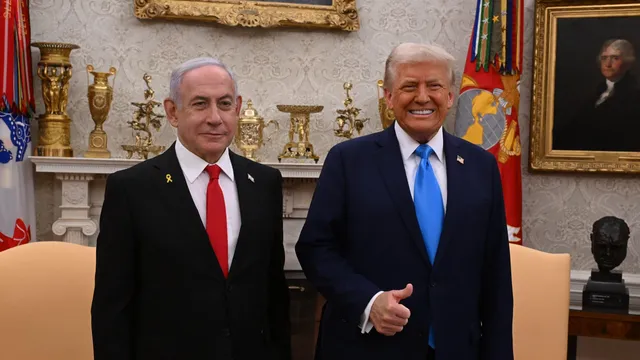
Netanyahu and Trump propose two-state solution with Palestinian Authority reforms
2025-06-28 09:13- Following a U.S. attack on Iran's nuclear facilities, Israel and the U.S. planned an expansion of peace deals.
- The proposed agreement includes a two-state solution contingent on Palestinian Authority reforms and a coalition governing Gaza.
- There is skepticism from the Palestinian leadership regarding acceptance of these terms, indicating challenges ahead for peace initiatives.
Express your sentiment!
Insights
In recent weeks, Israeli Prime Minister Benjamin Netanyahu and U.S. President Donald Trump have engaged in discussions regarding a two-state solution in the context of the region's shifting geopolitical landscape. Following the U.S. military campaign targeting Iran's nuclear facilities, both leaders reportedly expressed a collective optimism about the future of peace in the Middle East, catalyzed by Iran's weakened position. Their discussions included the potential normalization of relationships between Israel and multiple Muslim nations, with Syria and Saudi Arabia mentioned as key players in the expansion of the Abraham Accords. Additionally, they contemplated a framework where the Palestinian Authority would require internal reforms before entering negotiations for statehood, shifting the dynamics of previous agreements significantly. This proposed agreement also addressed the ongoing conflict in Gaza, suggesting that a coalition of Arab countries, including the United Arab Emirates and Egypt, may govern the territory post-conflict, with the exile of Hamas and conditions set for the eventual relocation of willing Gaza civilians. Despite Netanyahu's assertion of a potential 'tectonic shift' in diplomatic relations, there exists a palpable skepticism about the acceptance of these proposals by the Palestinian leadership, especially given the absence of commitments for full territorial withdrawal or reconstruction plans for Gaza. The urgency communicated by Israeli officials suggests that they view this moment as critical for realigning regional politics in favor of Israel's strategic interests. However, the inability of Hamas to either accept these terms or cooperate on a surrender basis, coupled with the dire humanitarian situation in Gaza, complicates the peace process. As health officials in Gaza report a critical lack of aid and worsening conditions, the stakes for a ceasefire grow higher. Observers have pointed out that if the Palestinian leadership perceives these proposed terms as undermining their interests, achieving a long-lasting peace agreement could prove elusive. This highlights the inherent challenges faced by Israeli leaders in securing broader support for their peace initiatives, as regional sentiments remain deeply entwined with the realities of the humanitarian crisis and ongoing tensions. Overall, the prospect of a renewed two-state solution seems contingent upon not only the compliance of the Palestinian Authority with prescribed reforms but also upon securing broader Arab and international support as part of a comprehensive peace initiative. This could mark a pivotal moment in Middle Eastern diplomacy, given Iran's diminished influence and a possible shift in how neighboring countries interact with Israel amidst evolving security dynamics.